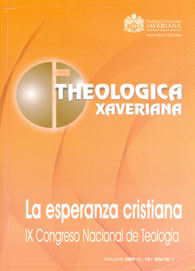Abstract
El tratamiento del tema de la esperanza, casi exclusivo de Pablo en el Nuevo Testamento, no se refiere a una virtud autónoma, sino que constituye un componente esencial e inseparable de la fe y el amor, de un todo que se llama el Evangelio, cuya realidad histórica constatable y concreta es la existencia cristiana dentro de la comunidad. Esto significa que la esperanza es un don, esto es, el Resucitado dándose en nosotros mismos por su Espíritu, que nos hace capaces de
superar con paciencia toda resistencia al amor permanente e incondicional de unos con otros dentro de la comunidad cristiana y nos asegura la vida sin fin con Cristo.
This journal is registered under a Creative Commons Attribution 4.0 International Public License. Thus, this work may be reproduced, distributed, and publicly shared in digital format, as long as the names of the authors and Pontificia Universidad Javeriana are acknowledged. Others are allowed to quote, adapt, transform, auto-archive, republish, and create based on this material, for any purpose (even commercial ones), provided the authorship is duly acknowledged, a link to the original work is provided, and it is specified if changes have been made. Pontificia Universidad Javeriana does not hold the rights of published works and the authors are solely responsible for the contents of their works; they keep the moral, intellectual, privacy, and publicity rights.
Approving the intervention of the work (review, copy-editing, translation, layout) and the following outreach, are granted through an use license and not through an assignment of rights. This means the journal and Pontificia Universidad Javeriana cannot be held responsible for any ethical malpractice by the authors. As a consequence of the protection granted by the use license, the journal is not required to publish recantations or modify information already published, unless the errata stems from the editorial management process. Publishing contents in this journal does not generate royalties for contributors.


